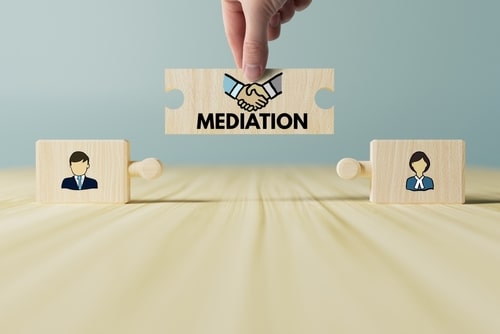How Divorce Mediation Works in Texas
 Mediation is a court-ordered process and alternative to traditional divorce litigation. Parties can choose to request mediation and present their agreement in writing, but it is up to the judge's discretion if mediation is granted in place of a traditional trial. A lawyer who is well-educated and experienced in mediation can provide insight into if mediation is the right choice for your divorce.
Mediation is a court-ordered process and alternative to traditional divorce litigation. Parties can choose to request mediation and present their agreement in writing, but it is up to the judge's discretion if mediation is granted in place of a traditional trial. A lawyer who is well-educated and experienced in mediation can provide insight into if mediation is the right choice for your divorce.
What is Mediation?
Two parties come together to resolve conflicts within their divorce, while a third-party mediator helps steer the situation toward a more amicable outcome. Mediation is most often used to resolve the three significant points of contention in a divorce: property division, child custody, and alimony. Mediation is a highly effective alternative negotiation method with a high success rate.
When Can Mediation Take Place?
Mediation is available either before or after the divorce petition has been filed. If both parties choose mediation once the divorce case has begun and have agreed in writing to attend, they or their lawyers must inform the judge of the decision.
You must attend court-ordered mediation regardless of whether you want to go or not. The only exception is an objection based on incidents of family violence. The objection must be filed in writing and take place before the final mediation order is entered. The non-objecting party can oppose the objection through a request. A mediation order will be upheld without sufficient evidence to support the claim of family violence.
What Agreement Must Be Signed For Mediation?
The divorce mediation agreement can be a binding contract if both parties agree to make it so. For this to take place, the divorce mediation agreement must:
- State the agreement cannot be revoked
- Be signed by both parties
- Be signed by both parties' attorneys (if applicable) at the time they sign
Children, friends, and family are not normally allowed at the mediation meeting. A single mediation meeting will normally last between four to six hours.
What Happens After Mediation?
Couples will either reach an agreed-upon settlement or need to set a future court date to allow a judge to resolve the remaining issues. For couples who do resolve their issues in mediation, they will need to implement the terms of their agreements and present them to the court for review and a final ruling.
Contact a Harris County, TX Divorce Attorney
The best kinds of divorce are those without domestic entanglements. The most straightforward way to break clean from a poor relationship is to have things settled before stepping foot in a courtroom. Though an attorney is not always necessary for mediation, it is a good idea to consult a skilled Houston, TX divorce lawyer for additional advice or to oversee the process. The Cusic Law Firm, P.C. can assist you in your divorce, whether contested, uncontested, or court-ordered mediation. You can contact the office at 713-650-1866 for a free consultation.



















